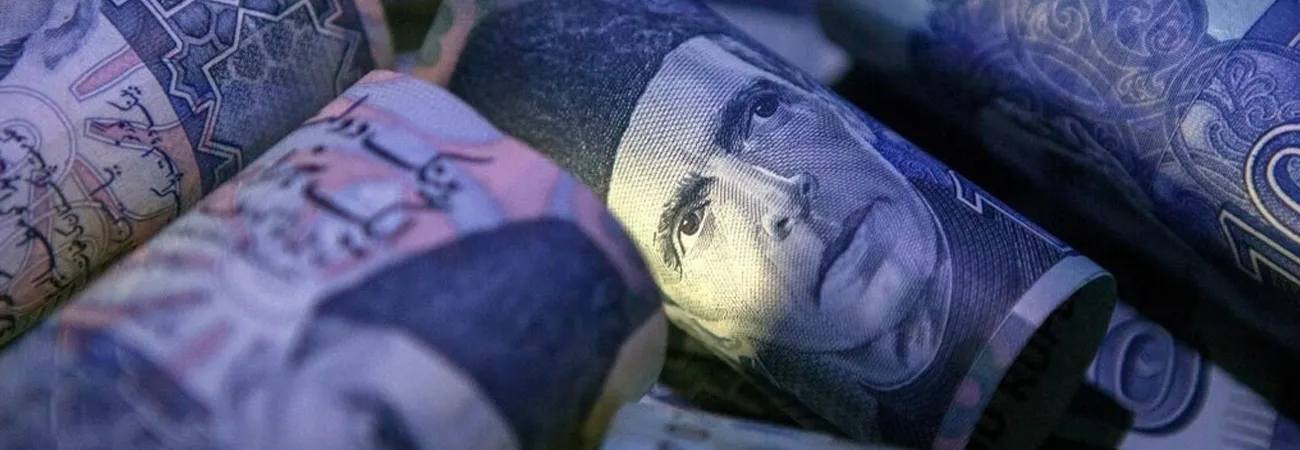i ECONOMY
The Pakistani rupee has been on an extraordinary winning streak for some time. This surge has unfolded against a backdrop of increased efforts by the government agencies to curb alleged illegal foreign exchange trading and implement regulatory reforms within exchange companies under the central bank's supervision. Furthermore, the market has been rife with speculation about a possible target exchange rate of Rs250 against the US dollar. While the accuracy of these rumours cannot be confirmed, they have undeniably played a role in influencing market sentiment, resulting in the rupee's remarkable upward trajectory over 28 consecutive trading days. "This continuous rise of the rupee becomes even more remarkable when we consider that there have been no significant improvements in the underlying economic fundamentals, including trade surpluses, balance of payments, inflation, and real interest rates, which typically support such substantial shifts in exchange rates," says Dr Eatzaz Ahmed, Memorial Chairperson at State Bank of Pakistan.
Talking to WealthPK, he said in the absence of these conventional factors, it appears that the primary driving force behind this sentiment shift and the currency's value lies in the resolute determination of authorities to adjust the exchange rate through administrative measures. He pointed out that while having a strong currency can offer apparent advantages, such as cheaper imports and inflation control, it is imperative to understand that when a government intervenes in exchange rate management, it essentially engages in centralised planning. "This approach presupposes that the central bank or government possesses the knowledge and capacity to determine the "correct" value of a currency, assuming access to all the pertinent information," he said, adding, however, that exchange rates are influenced by an array of variables and information dispersed throughout the market, making it impossible for any central authority to have access to all this data.
He said attempts to control exchange rates often result in distortions, inefficiencies, and failure. "Notably, in September 1992, the UK was unable to maintain the value of the pound within a specified limit and had to withdraw from the exchange rate mechanism of the European Monetary System," he pointed out. Eatzaz Ahmed said in Pakistan, the adverse effects of maintaining an overvalued rupee are well-documented. "Industries that could have otherwise been competitive have failed to reach their full potential due to a skewed exchange rate, resulting in the misallocation of resources to less efficient sectors."
He highlighted that the reduced competitiveness associated with an overvalued currency has been a significant factor contributing to slower economic growth compared to peer countries. "In the worst-case scenario, the exchange rate regime between 2013 and 2018 suppressed exports and boosted imports, leading to an all-time high trade deficit and a balance of payments crisis," he further highlighted. In the latest development, Eatzaz Ahmed said the one-way movement of the currency has attracted market participants looking to capitalise on what appears to be a guaranteed opportunity. "Exporters, for instance, are incentivised to forward book their export proceeds, while importers aim to defer payments to external vendors."
The SBP official maintained that these contracts will need to be settled approximately two to three months later, which could lead to a surge in demand for dollars without a corresponding increase in liquidity. "Consequently, a sudden and sharp depreciation could occur, once again leading to increased administered prices and inflationary pressures." "The distortions resulting from an overvalued rupee would be further exacerbated if it were used to anchor inflation and, consequently, facilitate monetary policy easing. This would skew interest rates, and encourage credit expansion when the overall macroeconomic conditions do not support sustainability, ultimately leading to a temporary economic boom followed by an extended downturn," he explained.
Credit: Independent News Pakistan (INP)








